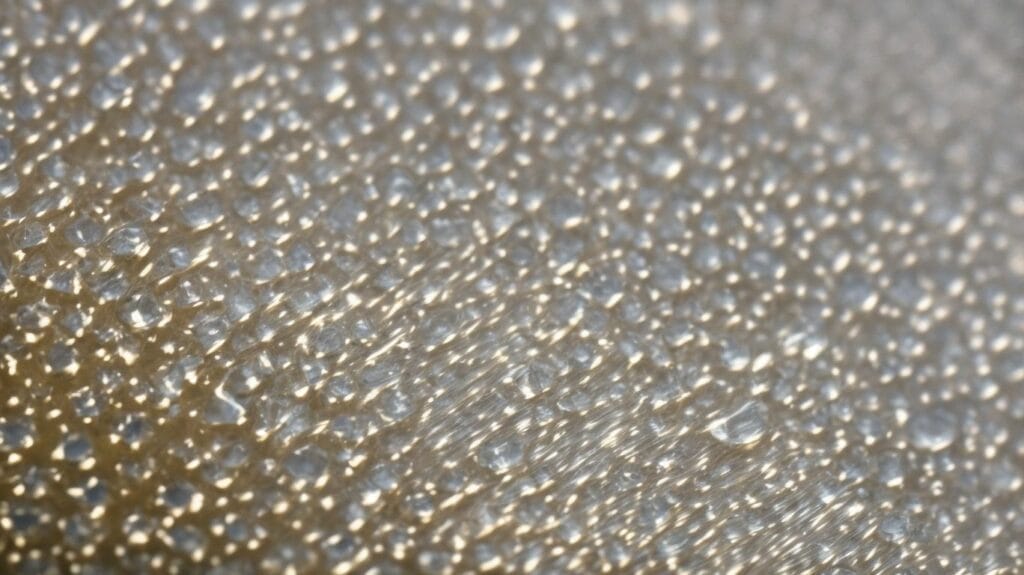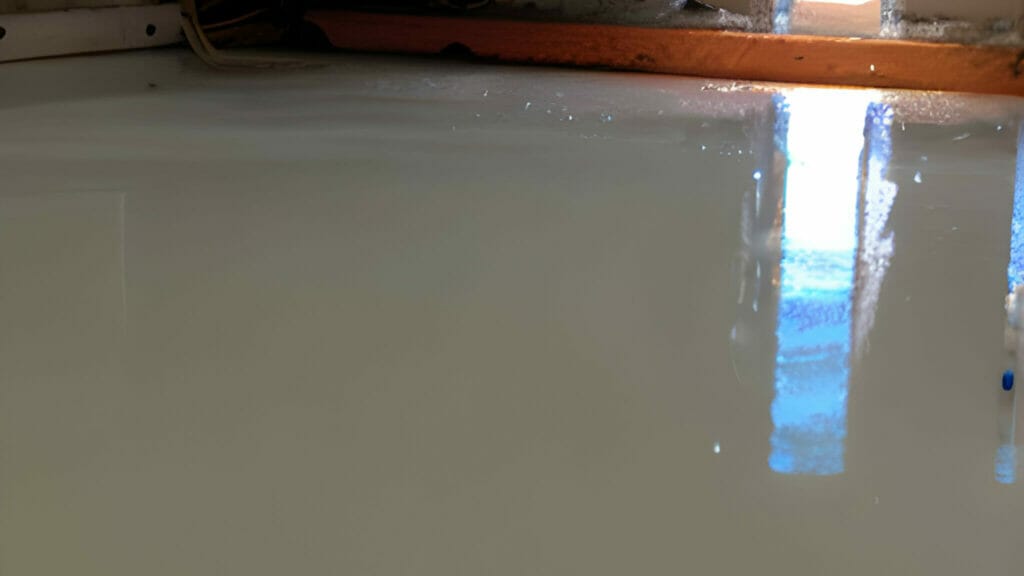Epoxy resin is a versatile synthetic compound that has gained popularity in various industries due to its strong adhesive properties and resistance to heat and chemicals. However, one question that often arises when considering the use of epoxy resin is whether it is waterproof or not.
Epoxy resin is, in fact, waterproof, making it an excellent choice for many projects. Its waterproofing properties are a result of its chemical composition and the way it is applied. Epoxy resin consists of two main components, a resin and a hardener, which, when combined and cured, create a durable and waterproof surface.
But what factors can affect the waterproofing of epoxy resin? Factors such as the application process, the ratio of resin to hardener, and the type of hardener used can affect the waterproofing abilities of epoxy resin. It is essential to follow the manufacturer’s instructions carefully to ensure proper waterproofing.
There are a few ways to make epoxy resin more waterproof, such as using a waterproofing additive, applying multiple coats, properly sealing the edges, and using a top coat. These methods can provide an extra layer of protection and increase the waterproofing capabilities of epoxy resin.
Waterproof epoxy resin has a wide range of uses in various industries, and some of the most common ones include:
- Outdoor furniture: Epoxy resin is a popular choice for coating outdoor furniture, as it provides a durable and waterproof surface.
- Boat building and repair: Due to its exceptional waterproofing properties, epoxy resin is commonly used for building and repairing boats.
- Swimming pools and water features: Epoxy resin is a popular choice for coating and sealing swimming pools and water features due to its waterproofing abilities.
- Bathroom and kitchen surfaces: Epoxy resin is often used to create waterproof surfaces in bathrooms and kitchens, such as countertops and backsplashes.
While epoxy resin is a commonly used and trusted waterproofing solution, there are alternatives available. These include polyurethane resin, silicone resin, acrylic resin, and polyester resin. Each of these options has its unique properties and is suitable for different applications.
In conclusion, epoxy resin is indeed waterproof, making it a versatile and practical choice for a wide range of projects. Proper application and following the manufacturer’s instructions are crucial in ensuring its waterproofing abilities. So, whether you’re looking to protect outdoor furniture or seal a swimming pool, waterproof epoxy resin is a reliable and durable option.
Key Takeaways:
- Epoxy resin is a versatile material that offers strong adhesive properties and can be made waterproof.
- Proper application and sealing of epoxy resin can make it highly resistant to water, making it suitable for various outdoor and water-related applications.
- Alternatives to waterproof epoxy resin include polyurethane, silicone, acrylic, and polyester resin, each with its own set of advantages and uses.
What is Epoxy Resin?
Epoxy resin is a synthetic resin with exceptional adhesive and mechanical properties. It is formed by combining epichlorohydrin and bisphenol-A through a chemical reaction. Due to its strength and durability, epoxy resin is extensively utilized in a variety of applications, including coatings, adhesives, and composite materials. Its ability to withstand water also makes it well-suited for use in applications that require water resistance.
How Does Epoxy Resin Work?
- Epoxy resin consists of two components that must be mixed: resin and hardener.
- When these components are mixed, a chemical reaction occurs, resulting in a strong, durable, and waterproof material.
- The curing process takes place within a specific timeframe, during which the resin hardens and becomes resistant to moisture.
- Once fully cured, epoxy resin creates a protective and waterproof seal on a variety of surfaces.
Fun fact: Due to its exceptional waterproofing properties, epoxy resin is commonly used in marine applications.
Is Epoxy Resin Waterproof?
Is Epoxy Resin Waterproof?
Epoxy resin is naturally waterproof, making it the perfect choice for any project that requires water resistance. Its unique chemical composition creates a strong barrier against moisture, effectively preventing water from penetrating through. Whether you’re coating countertops or creating jewelry, epoxy resin is a dependable option for waterproofing. Just be sure to properly prepare the surface and follow the manufacturer’s guidelines for optimal results.
What Factors Affect the Waterproofing of Epoxy Resin?
What factors affect the waterproofing of epoxy resin?
Several factors influence the waterproofing of epoxy resin:
- Proper Mixing: The waterproofing ability of epoxy resin can be affected by an inaccurate ratio of resin and hardener.
- Curing Time: Rushing the curing process can result in a weaker, less waterproof finish.
- Environmental Conditions: The curing process and final waterproofing can be impacted by humidity and temperature.
- Surface Preparation: Inadequate surface preparation can compromise the bond and waterproofing of epoxy resin.
- Resin Quality: The use of high-quality epoxy resin can enhance its waterproofing performance.
How Can You Make Epoxy Resin Waterproof?
Epoxy resin is a versatile and durable material that is commonly used for various DIY projects. However, one question that often arises is whether or not epoxy resin is waterproof. In this section, we will discuss how you can make epoxy resin waterproof by utilizing different techniques and methods. From using a waterproofing additive to applying multiple coats and properly sealing the edges, we will cover all the important steps to ensure your epoxy resin creations are fully waterproof.
1. Use a Waterproofing Additive
- Select a premium waterproofing additive specifically designed for use with epoxy resin.
- Follow the provided instructions from the manufacturer to determine the appropriate ratio of additive to resin.
- Thoroughly combine the waterproofing additive with the epoxy resin to achieve uniform distribution.
2. Apply Multiple Coats
To achieve waterproofing with epoxy resin, follow these steps:
- Apply the first coat and allow it to dry completely.
- Lightly sand the surface before applying the second coat to ensure proper adhesion.
- Repeat this process for multiple coats, making sure each layer is fully dry and well bonded.
Epoxy resin was originally developed in the 1920s by Dr. Pierre Castan, a Swiss chemist, and gained significant commercial importance during World War II for a variety of military applications.
3. Properly Seal the Edges
- Ensure clean and dry edges.
- Apply epoxy resin with a brush or syringe to properly seal the edges thoroughly.
- Remove any excess resin to prevent drips or uneven coating
- Allow the resin to cure completely for a tight seal
For effective edge sealing, it is important to prioritize thoroughness and precision to prevent any potential leaks or water damage.
4. Use a Top Coat
- Clean the surface: Ensure the epoxy resin surface is free of dust, dirt, and any imperfections.
- Mix the top coat: Prepare the top coat according to the manufacturer’s instructions, making sure it is well-blended.
- Apply the top coat: Use a brush or roller to evenly apply the top coat over the cured epoxy resin, covering the entire surface.
- Cure the top coat: Allow the top coat to cure for the recommended time, ensuring it forms a protective and waterproof layer.
What Are the Uses of Waterproof Epoxy Resin?
Epoxy resin is a versatile and durable material that is commonly used in various industries. One of its most sought-after properties is its waterproof nature. In this section, we will discuss the various uses of waterproof epoxy resin and how it is utilized in different applications. From outdoor furniture to boat building and swimming pools to bathroom and kitchen surfaces, we will explore the diverse ways in which waterproof epoxy resin can be incorporated into our daily lives.
1. Outdoor Furniture
- Prepare the Surface: Sand the outdoor furniture to remove any existing finish and create a rough surface for the epoxy to adhere to.
- Apply Epoxy Resin: Use a brush or roller to apply a thin, even coat of waterproof epoxy resin, ensuring complete coverage.
- Cure and Seal: Allow the epoxy to cure fully, then seal the surface with a topcoat to enhance durability.
Pro-tip: Consider adding UV-resistant additives to protect outdoor furniture from sun damage.
2. Boat Building and Repair
- For boat building and repair, start by preparing the surface with thorough sanding and cleaning.
- Next, apply epoxy resin to seal and protect the boat’s surface.
- During the application process, make sure to have proper ventilation and temperature control.
- Allow the resin to cure completely before sanding and adding additional coats.
Once, a friend used waterproof epoxy resin to repair a small crack in his boat successfully. Thanks to the repair, he was able to enjoy boating without any issues of water seepage.
3. Swimming Pools and Water Features
To waterproof epoxy resin for swimming pools and water features:
- Ensure the surface is clean and dry.
- Apply a waterproofing additive to the epoxy resin mixture.
- Use a top coat to enhance water resistance.
Fact: Waterproof epoxy resin is commonly used to seal and protect surfaces of swimming pools and water features.
4. Bathroom and Kitchen Surfaces
- Prepare the surface: Clean and dry the bathroom or kitchen surface thoroughly to remove any dirt, grease, or moisture.
- Apply primer: Use a suitable primer to ensure better adhesion of the epoxy resin to the bathroom and kitchen surfaces.
- Mix and pour epoxy resin: Follow the manufacturer’s instructions to mix the epoxy resin and pour it onto the prepared surface evenly.
- Spread and level: Use a spatula or brush to spread the resin evenly and ensure it covers the entire bathroom and kitchen surfaces.
- Allow curing: Let the epoxy resin cure for the recommended time to achieve a waterproof and durable finish on the bathroom and kitchen surfaces.
Are There Any Alternatives to Waterproof Epoxy Resin?
While epoxy resin is a popular choice for waterproofing projects, it is not the only option available. In fact, there are several alternatives to epoxy resin that offer similar or even better waterproofing properties. In this section, we will discuss four common alternatives: polyurethane resin, silicone resin, acrylic resin, and polyester resin. By exploring the unique characteristics and uses of each type of resin, you can determine the best option for your specific waterproofing needs.
1. Polyurethane Resin
Polyurethane resin is a versatile material commonly used for various applications. Follow these steps for using polyurethane resin:
- Prepare the work area and ensure proper ventilation.
- Measure the prescribed amounts of resin and hardener according to the manufacturer’s instructions.
- Thoroughly mix the resin and hardener for the specified duration.
- Carefully pour the mixture into the prepared mold or surface.
- Allow the resin to cure for the recommended time before handling.
Polyurethane resin was initially developed during World War II for military purposes, but its usage has since expanded across industries due to its durability and versatility.
2. Silicone Resin
Silicone resin, a popular substitute for waterproof epoxy resin, provides outstanding durability and water resistance. It is frequently utilized in outdoor settings, electrical insulation, and automotive parts because of its exceptional thermal stability and ability to withstand various weather conditions.
Fun fact: Silicone resin is capable of enduring extreme temperatures, ranging from -100°C to 250°C.
3. Acrylic Resin
Acrylic resin, also known as polymethyl methacrylate (PMMA), is a transparent thermoplastic that is commonly used as a substitute for epoxy resin. One of the main advantages of acrylic resin is its exceptional weather resistance, making it a great option for outdoor use. Its high gloss and clarity also make it a popular choice for decorative coatings, art pieces, and furniture. Furthermore, acrylic resin is appreciated for its impact resistance, ease of processing, and ability to bond well with various materials.
4. Polyester Resin
Polyester resin, a versatile liquid polymer, is well-known for its resistance to chemicals, heat, and weathering, making it a suitable alternative to waterproof epoxy resin.
Fun fact: Polyester resin is commonly used in the construction of fiberglass boats due to its durability and water resistance.


